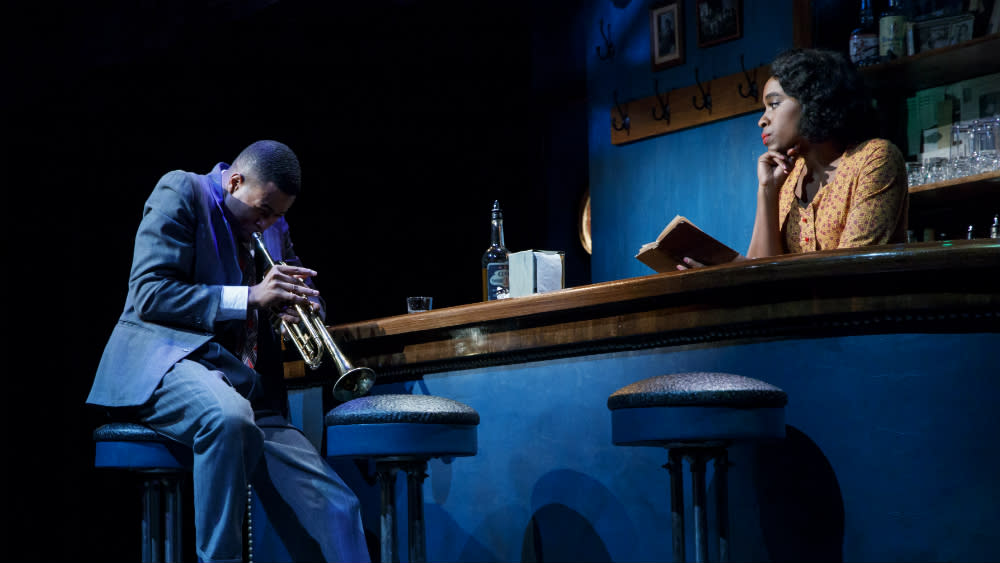Off Broadway Review: ‘Paradise Blue’

The scene of “Paradise Blue,” Dominique Morisseau’s black-and-bluesy play, is the Paradise Club, a drink and dance joint in Paradise Valley, the entertainment district of Detroit‘s black community known in 1949 as Blackbottom. The drinks are strong, the rooms are cheap, and you can hear live music by terrific jazzmen like Blue (lean, handsome and moody as hell in J. Alphonse Nicholson’s performance), who plays a mean trumpet when he isn’t too depressed to lift his horn to his lips.
Program notes inform us that Paradise Valley is not long for this world, doomed to fall under the wrecking-ball projects that would soon “urban-renew” the entire black community out of existence. That bit of background lends a good deal of perspective to the play, and it’s too bad that the playwright didn’t make it integral to her plot-thin drama. Lacking that kind of thematic core, the play restricts itself to being an atmospheric but insubstantial slice of dramatic life.
In this staging at Off Broadway’s Signature Theatre, Kristolyn Lloyd gives a lovely, self-effacing performance as Pumpkin, the cook-waitress-housekeeper who is the emotional heart of the Paradise Club and of the play itself. She’s a sensitive soul, given to walking around with a book of poetry whose beautiful thoughts she’s intent on committing to memory, as if beauty alone could insulate her from the unkindness of her mean world. In a play that otherwise lacks dramatic suspense, Pumpkin’s uncertain fate is something that causes us genuine concern.
In lieu of a plot, Morisseau presents us with a cast of full-bodied characters. Cornelius, who is known as Corn and played with a big heart and great gusto by Keith Randolph Smith, is the house pianist and resident sweetie-pie, always looking for love and always doomed to disappointment. Silver, a sexy vamp played with sultry charm by Simone Missick (the superheroic Misty on Marvel’s “Luke Cage”), is the lodger everyone wants to literally get close to. P-Sam, the sweet-talking percussion man played by Francois Battiste, is a shameless hustler.
As a cross-section of the club that represents life in Paradise Valley, the characters are a few players short of the swinging band this play needs. But under the confident direction of Ruben Santiago-Hudson, the thesps have a good handle on their characters and the creative team offers them heroic support. Neil Patel’s set design makes the Paradise Club look and feel like the home-away-from-home that’s the closest thing homeless musicians can call home. Rui Rita’s lighting is dark enough to let them keep up the pretense, and Darron L. West’s sound design kindly blocks out the unkind sounds of the real world outside.
Everyone speaks in the choice idiom that Morisseau seems to have snatched from the streets of a city she obviously knows well and loves unconditionally. Pumpkin has a sweet sound. Corn talks softly, but with conviction. And although he’s undeveloped as a character (and underplayed by Nicholson), Blue speaks with the passionate conviction of the egotist he is. “Everybody know this is Blue’s Blackbottom Quartet,” he says. “My club. My band. Ain’t nobody getting’ solo time but me.”
Knowing as we do what’s in store for Blackbottom, it seems clear that Morisseau intends Blue to be the tragic figure whose personal fate is bound up in that of his neighborhood. But in order to be that character, Blue needs more depth, along with a richer sense of humanity. Actually, what he needs to be is a little bit like Pumpkin.
Related stories
Off Broadway Review: Billy Crudup in 'Harry Clarke'
Harold Wolpert Named Exec Director of Off Broadway's Signature Theater
Off Broadway Review: Chloë Sevigny in 'Downtown Race Riot'
Subscribe to Variety Newsletters and Email Alerts!

 Yahoo News
Yahoo News 
